Engaging your community through a listening session can yield valuable insights and is crucial for embracing diverse perspectives. After all, your organization's mission should be shaped by the voices of the community.
The Minnesota Alliance for Volunteer Advancement (MAVA) used the power of listening sessions to inform their detailed report, "Co-Creating Racial Equity in Volunteer Engagement." Although it's highly encouraged for volunteer leaders to check out the full report, we've put together some valuable tips for hosting your own impactful listening session.
Ready to implement listening sessions to bridge the gap between organizations and the community they serve? Use this guide to create meaningful social change through community conversations and listening sessions.
Let's dive in.
What is a Listening Session?
For nonprofit leaders, volunteer coordinators, or executive directors, creating a meaningful platform for open dialogue is crucial.
At its core, a listening session is a structured but open forum designed to capture feedback, insights, and ideas from a group of people. Think of it as a roundtable where every voice matters and every opinion helps paint a fuller picture.
Listening sessions aren't just about speaking up, but actively listening to what others have to say. These sessions are particularly vital for organizations looking to deeply understand their community's needs, challenges, and aspirations.
When done well, listening sessions can uncover valuable perspectives that might otherwise go unheard, serving as a powerful tool for co-creating solutions and strategies that resonate with a wide array of stakeholders. MAVA has successfully used listening sessions in order to inform their report, “Co-Creating Racial Equity in Volunteer Engagement."
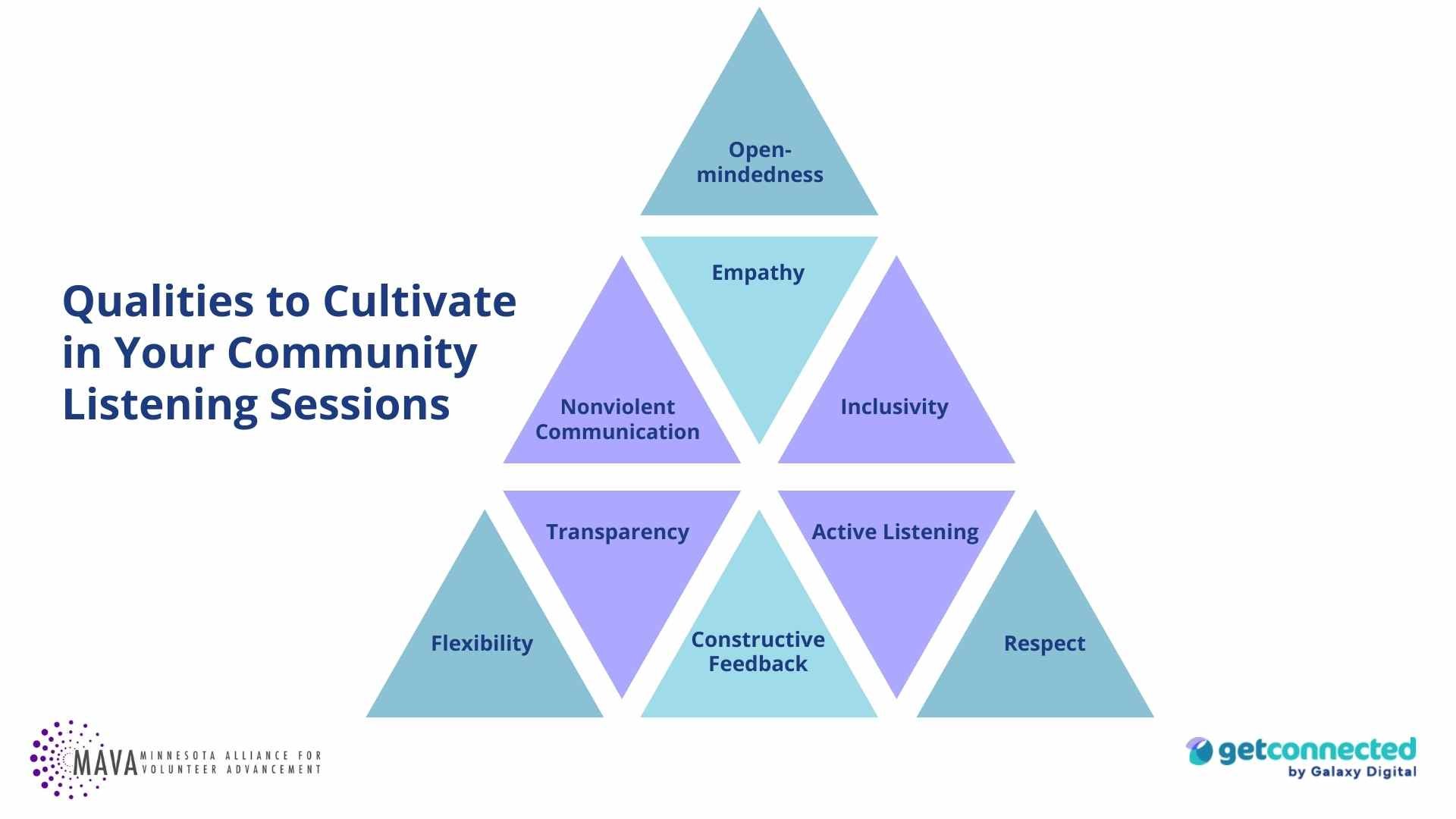
Qualities to Cultivate in Your Community Listening Sessions
Creating a space where community members feel truly heard and valued is key to the success of any listening session. Here are some qualities to foster:
- Open-mindedness
- Empathy
- Nonviolent Communication
- Inclusivity
- Transparency
- Active Listening
- Flexibility
- Constructive Feedback
- Respect
By cultivating these qualities, your listening sessions can become a powerful platform for meaningful dialogue, allowing you to truly connect with your community and effect positive change.
Compensating Participants for Emotional Labor
When organizing listening sessions, particularly those targeting BIPOC community members, it's important to recognize the emotional effort required to share personal experiences and insights. By acknowledging and compensating for this effort, we not only honor the participants' input but also establish a foundation for fair and mutually beneficial collaborations.
Compensation can take different forms:
- Money
- Vouchers
- Giftcards
- Support Services
Offering compensation recognizes the effort and emotional strength needed for conversations on personal topics. This fosters a culture of respect, showing participants their perspectives are valued contributions to the community.
By valuing compensation in organizing a listening session, organizations show dedication to ethical engagement and community well-being.
The aim is to shift from an extractive approach to gathering information to one centered on community partnership and collaborative creation.
This enriches feedback quality and strengthens the organization-community bond for impactful social change.
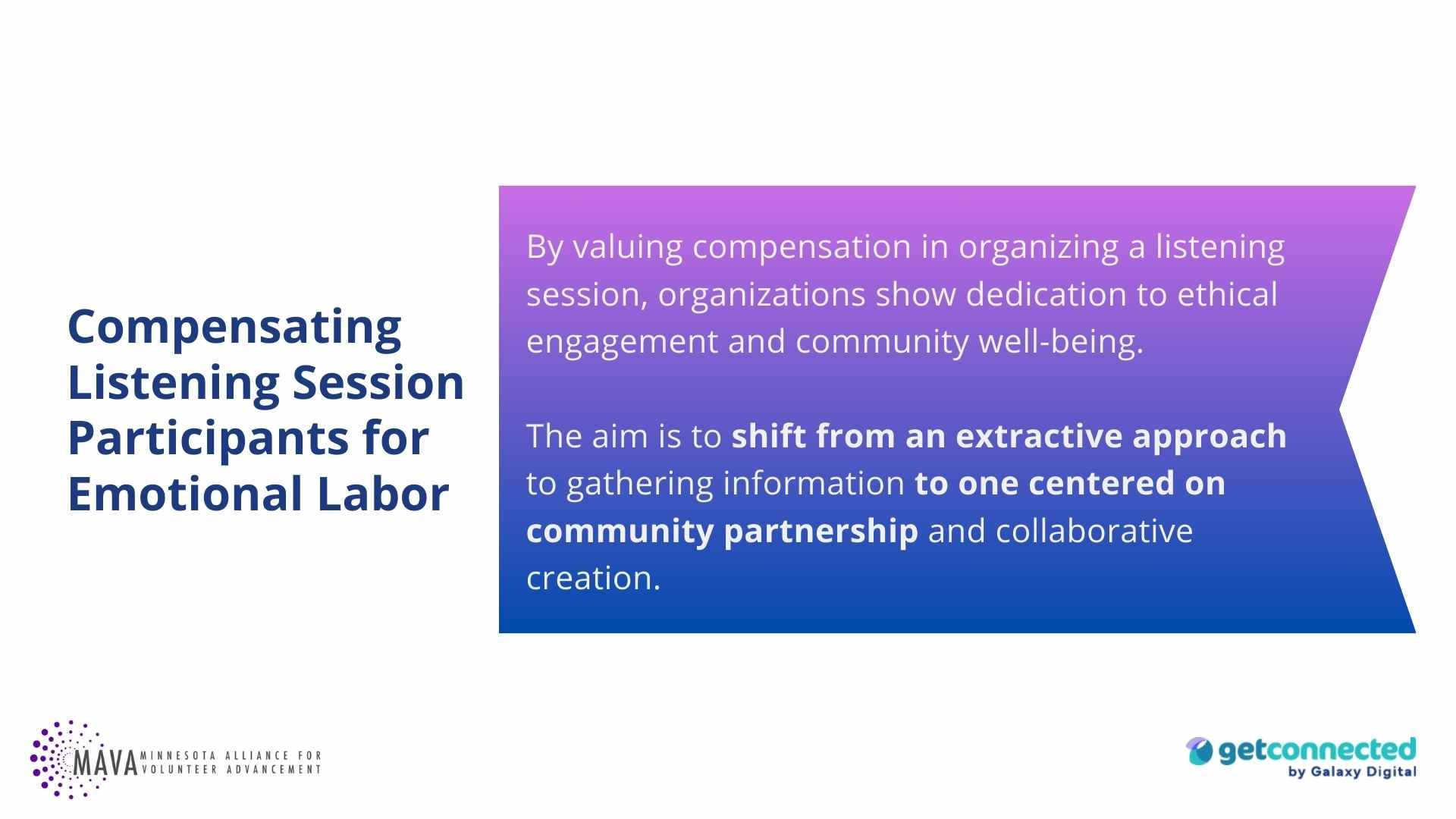
Removing Barriers Through Compensation
Compensating volunteers for their participation in listening sessions is not just an act of appreciation; it's a strategic approach to removing barriers and enabling broader participation.
Many individuals, especially those from underprivileged backgrounds, may face practical constraints like:
- Cost of/access to transportation
- Need for childcare
- Loss of hourly wages when they volunteer their time
Organizations can ease these burdens by providing compensation, enabling a broader range of community members to offer their valuable perspectives. This inclusive approach guarantees that the voices heard represent a diverse cross-section of the community, not just those with the means to participate.
By compensating listening session attendees, we take a crucial step towards democratizing participation, ensuring that every community segment has a chance to be heard and influence the change they desire.
1. Clarify Your Objectives and Messaging
Before you even send out the invite, be clear about what you aim to achieve and how you'll communicate the purpose of the session. People are more likely to engage if they understand the 'why' of your initiative.
Craft key messages that resonate with your audience to increase attendance and set the tone for a productive conversation.
Action Steps:
- Clearly define the goal of the session in a succinct manner, ensuring participants understand the aim.
- Develop a communication strategy that highlights the benefits of attending and the potential impact of their input.
- Tailor your messages to different segments within your audience, addressing personal motivations and interests.
2. Create a Welcoming Environment
The comfort of your participants directly influences the quality of the feedback you receive. A non-threatening, relaxing, and inclusive environment fosters honesty and transparency.
Be mindful of the setting, whether in-person or virtual, and ensure it's conducive to open dialogue.
Action Steps:
- Choose an easily accessible and comfortable location or platform for the session.
- Set up the physical space and digital interfaces so that everyone's presence and voice feel valued.
- Begin with an informal icebreaker to help participants relax and acquaint themselves with others before discussions start.
3. Design Relevant and Coherent Questions
The foundation of your listening session is the questions you ask. They must be clear, focused, and designed to elicit thoughtful responses.
Ensure your questions are both broad enough to encourage varied opinions and specific enough to steer the conversation.
Action Steps:
- Create a question guide that addresses your session's objective without bias.
- Reference similar research or feedback, but avoid leading questions that might influence responses.
- Time the questions strategically to flow from broad topics to more specific issues, allowing the discussion to deepen.
4. Capture and Analyze the Data
Every insight shared is valuable, but data loses its potency if not captured and analyzed correctly.
Use recording tools and surveys to gather responses, and then efficiently categorize the information. This allows for thoughtful analysis and meaningful takeaways once the session wraps up.
Action Steps:
- Respect participants' privacy concerns by adopting anonymous methods of data capture.
- Use technology, if viable, that records sessions while maintaining control and understanding of participants' consent to recording.
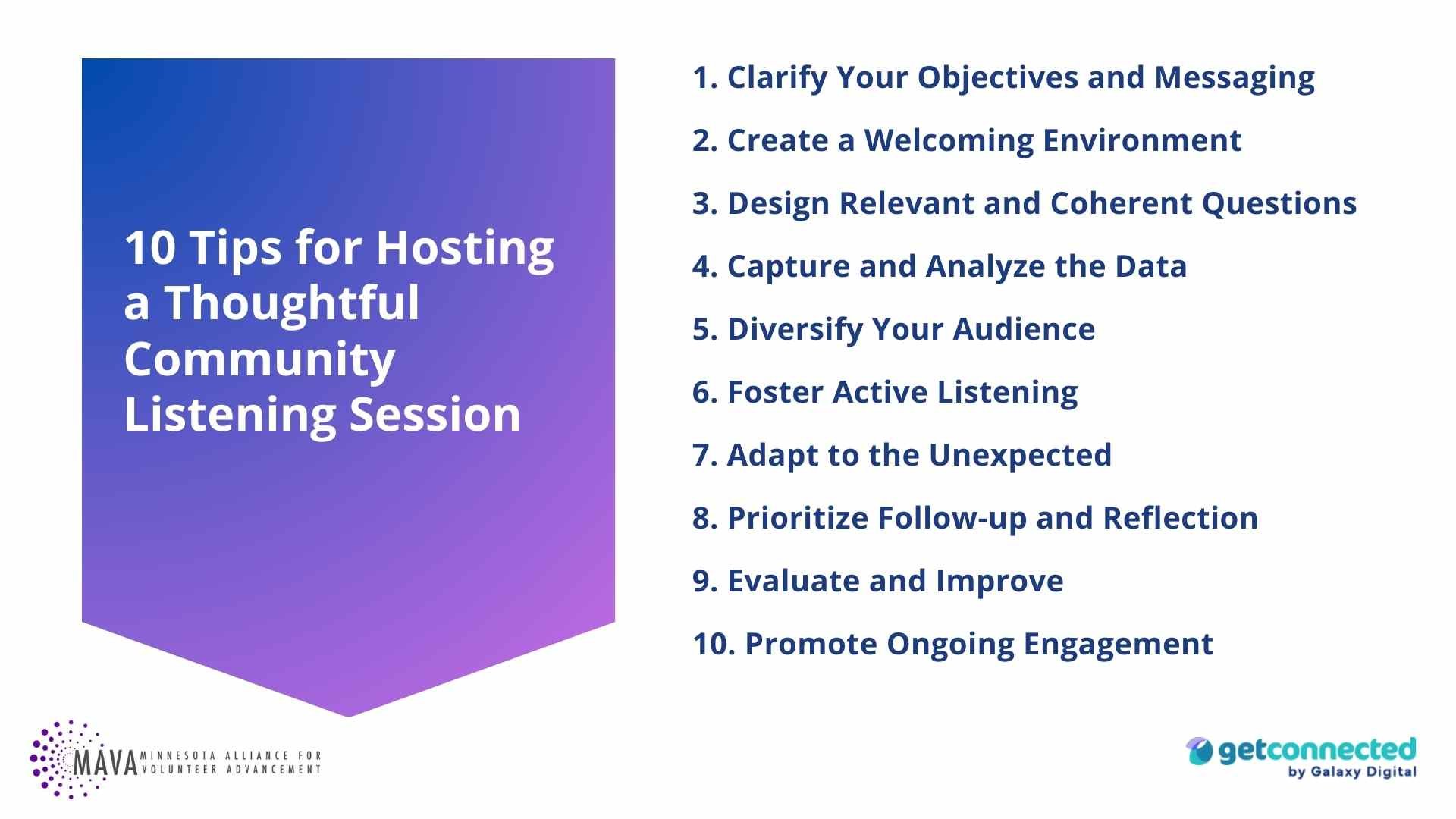
5. Diversify Your Audience
To ensure a robust representation of community voices, it's important to cast a wide net when inviting participants. Seek out community leaders, local influencers, and ordinary citizens to create a diverse mix of perspectives.
Action Steps:
- Work with a network of local stakeholders to identify potential participants who reflect the community's diversity.
- Encourage participants to share their unique experiences and views, emphasizing that all voices are welcome and valued.
- Ensure a balanced demographic representation, not merely on paper but throughout the spectrum of the session's proceedings.
6. Foster Active Listening
Listening is an art and a skill.
To truly engage with your community, you must actively listen—maintaining eye contact, nodding, and providing verbal and non-verbal cues that you're processing the information. This also ensures participants feel heard, encouraging them to share more openly.
Action Steps:
- Train session facilitators on active listening techniques, reinforcing their role in encouraging participation.
- Encourage participants to respond to each other's contributions, creating a conversation rather than a one-way dialogue.
- Periodically summarize what you've heard, ensuring that your interpretation aligns with the participants' intentions.
7. Adapt to the Unexpected
In any gathering, unexpected situations arise. Prepare your team to handle disruptions or unanticipated feedback with grace and adaptability. These moments can sometimes lead to the most insightful discussions.
Action Steps:
- Develop a contingency plan that addresses potential disruptions or technical challenges, like a designated person for troubleshooting.
- Foster an environment where participants can express sudden feelings or concerns without feeling shut down.
- Remind everyone that respectful disagreement and change in the session's agenda are welcome if they help achieve the objective.

Like this article?
Get more like it, plus access to exclusive reports, training, and networking events by joining MAVA's network of Volunteer Engagement Professionals.
8. Prioritize Follow-up and Reflection
The end of a listening session is not the conclusion of community interaction. It's a transition to action.
Reflect on the insights gathered, and create a plan for follow-up communication. Participants should leave knowing their input was critical and will be acted upon.
Action Steps:
- Share a summary of the session's findings with all participants and request feedback on the interpretation.
- Develop an action plan that includes how the organization will respond to the community's voice.
- Clearly communicate any changes or initiatives resulting from the session, uplifting and crediting the voices behind the decisions.
9. Evaluate and Improve
Self-reflection is key to improving future sessions and the overall listening experience. Take the time to assess what went well, what could be better, and how you can make adjustments for your next gathering.
Action Steps:
- Collect feedback from session participants on their experience and the effectiveness of the event.
- Engage your facilitation team in an open discussion about what worked and what didn't.
- Use these learnings to make data-backed enhancements to your future listening sessions.
10. Promote Ongoing Engagement
The relationship with your community should be a continuous conversation, not a one-time event.
Plan for follow-up engagements, be it another listening session, a casual meet-up, or ongoing communication, to maintain a strong connection with your participants.
Action Steps:
- Implement regular touch points with the community, such as newsletters, forums, or social media engagements.
- Build on relationships by recognizing previous participants and inviting them to later initiatives or celebrations of progress made.
- Cultivate a culture of openness where participants feel that their voice matters, and encourage them to share their perspectives regularly.
By following these 10 tips and truly listening - to understand, reflect, and act - you will create purposeful and respectful listening sessions that are responsive to your community's needs.
How We Can Co-Create Racial Equity in Volunteerism
Promoting racial equity in volunteerism necessitates a collaborative and intentional effort from individuals, volunteer programs, and organizations. By fostering inclusive practices, providing equitable opportunities, and actively addressing systemic barriers, we can work together to create a more just and inclusive volunteer community.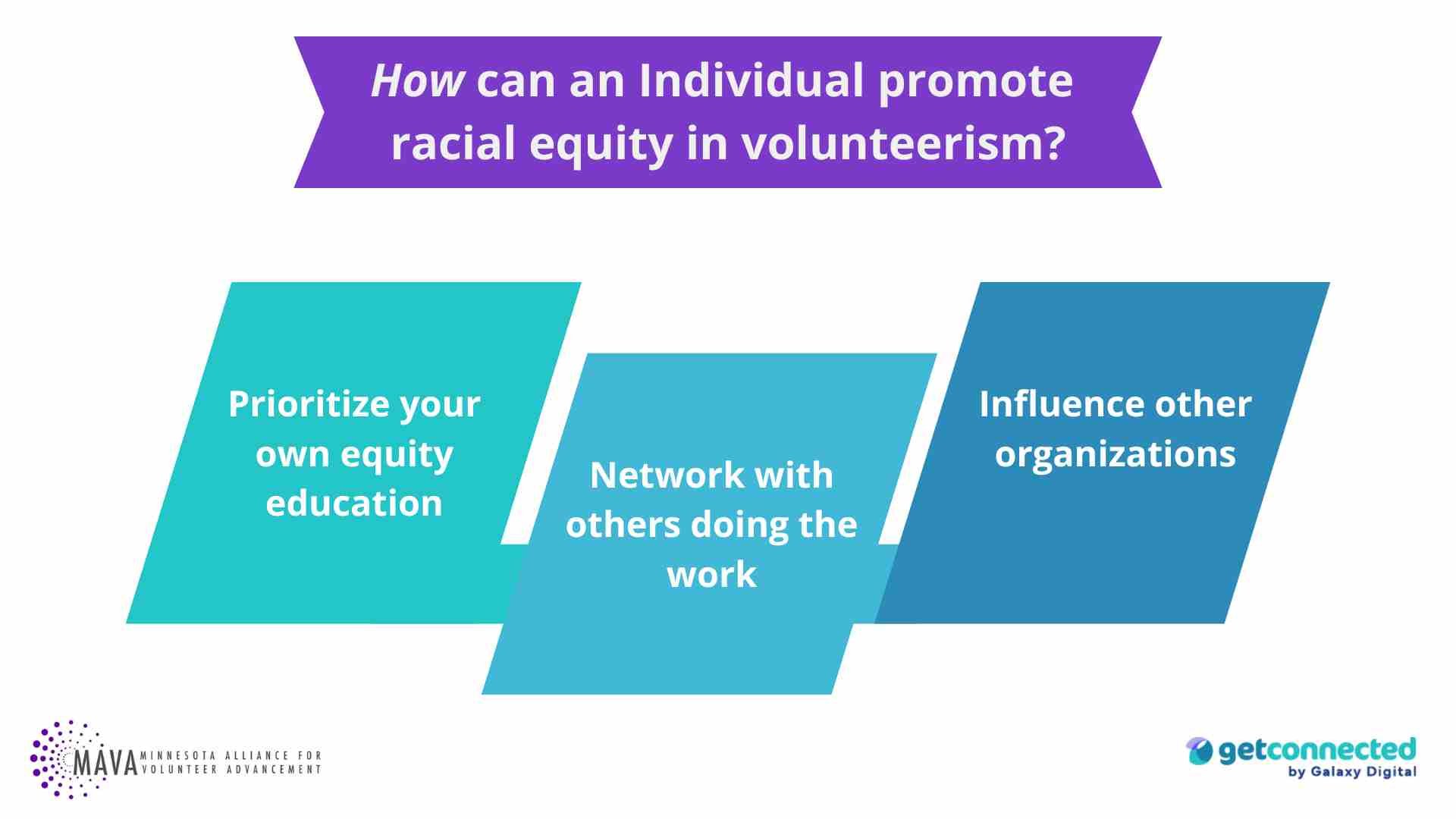
The Individual
It begins with a personal commitment to understanding and dismantling systemic biases that pervade society. Prioritize your own equity education, network with others doing the work, and influence other organizations. Individuals can actively seek education on racial equity, participate in discussions, and advocate for inclusivity in all volunteering opportunities.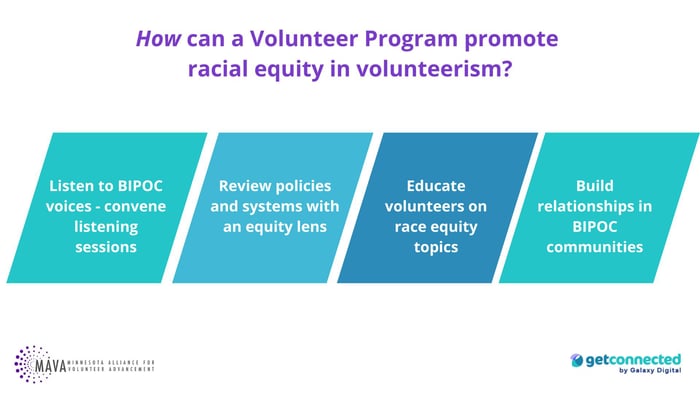
The Volunteer Program
Volunteer programs play a crucial role by implementing recruitment strategies that reach diverse communities, offering training that includes racial equity and sensitivity, and ensuring their leadership reflects the diversity they wish to see in their volunteers. It’s imperative to create spaces where all volunteers feel valued, heard, and empowered to bring their whole selves to the service of the community. Additionally, listening to BIPOC voices and convening listening sessions, reviewing policies and systems with an equity lens, educating volunteers on racial equity topics, and building relationships in BIPOC communities can further strengthen the impact and inclusivity of volunteer initiatives.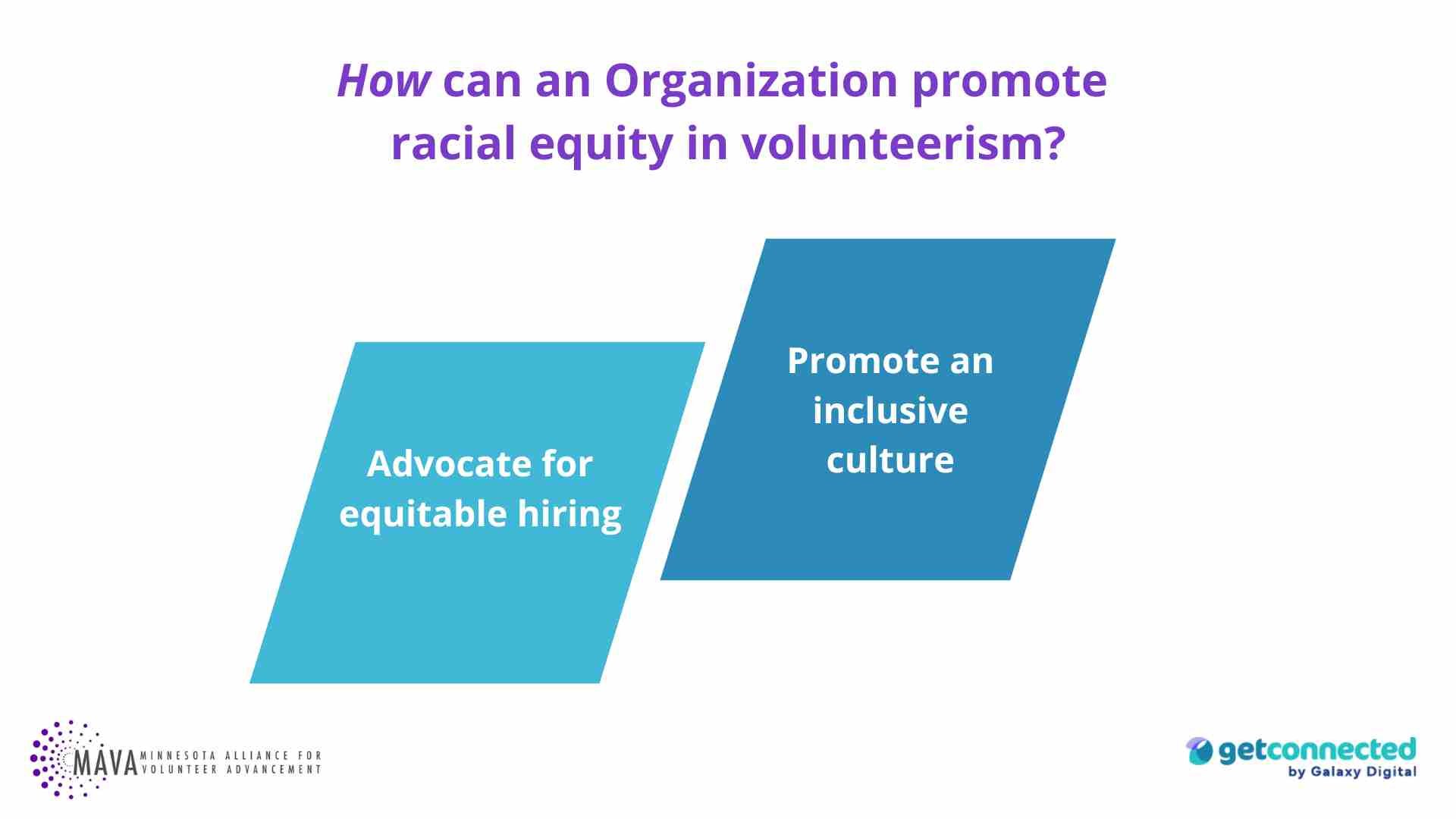
The Organization
Nonprofits bear the overarching responsibility of incorporating racial equity into their mission. This includes critically evaluating their policies, practices, and culture through an equity lens, and making essential adjustments. Engaging with the community they serve, to grasp unique challenges and perspectives, helps strengthen their dedication to equity. Moreover, advocating for equitable hiring practices and promoting an inclusive culture, along with transparency in their endeavors — sharing successes and areas for improvement — fosters trust and accountability.
MAVA's 2024 Report:
From Listening to Action
To find a recent example of MAVA's listening sessions, check out
From Listening to Action: Insights from BIPOC Volunteer Engagement Professionals
By embedding these practices into the ethos of volunteerism, individuals, programs, and organizations can foster environments that are not only inclusive but are actively working towards dismantling racial inequities.
The goal is to create a volunteer community that truly reflects the diversity of society, where every individual can contribute to making meaningful change.
Through ongoing learning, adaptation, and engagement, we can collectively shift towards more equitable volunteerism that uplifts and respects all voices. Hosting a thoughtful community listening session can further amplify diverse voices and pave the way for even greater understanding and collaboration.





